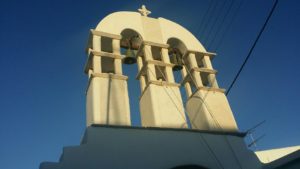 I borrowed the title of this entry from Clinton-era poet-laureate, Maya Angelou’s book of poetry by the same title. It hints at knowing oppression (caging) firsthand; understanding why; and giving voice to that. In almost two weeks in a country infused with Greek Orthodox Church tradition, I have yet to find a single person who attends church even once a month on Sundays. My brief exposure to “the church” attending a couple of services underscored the fact that, at 65, I was the youngest person attending each time.
I borrowed the title of this entry from Clinton-era poet-laureate, Maya Angelou’s book of poetry by the same title. It hints at knowing oppression (caging) firsthand; understanding why; and giving voice to that. In almost two weeks in a country infused with Greek Orthodox Church tradition, I have yet to find a single person who attends church even once a month on Sundays. My brief exposure to “the church” attending a couple of services underscored the fact that, at 65, I was the youngest person attending each time.
The founders of our nation went to great lengths to ensure that the church would have no say in matters of governance and vice versa. They had seen the direct results of that with the English clergy (and Congregationalist) in the colonies. This is why, by 1776, all the Anglican clergy in the colonies except for 19, fled back to England or Canada. This is also why Morning Prayer became established for 170 years as the main service, but that’s another story.
Other countries, like Greece, still have the church joined to the state at the hip (or other anatomical sites). While the bishops have no say in matters of Greek governance, everyone knows that if legislation is not pleasing to the church, it will not pass or it will be revised. The Greeks (and the English) are working to “disestablish” their respective churches, and that will be a good thing. Islamic countries have the same kind of situation where they may even be run by a “theocracy.”
We do not have a flagpole on our church yard and I very much appreciate that. I also prefer not to preach with an American flag behind me. I’m all for our flag and country, but the church does not exist to support the country nor vice versa. Movements in favor of public prayer in schools and various closer church-state connections are dangerous for the health of BOTH institutions.
I have not met a person in Greece, Egypt, Mexico or England where they think the establishment of a church-state relation is a good thing. Here, the people resent the church. The average working class family might makes 500 to 1000 Euros a month. When the church charges everyone a flat fee of 100 Euros for weddings or funerals and 50 Euros for baptism, that is a significant dent in a middle class paycheck.
Meanwhile, the church seems to be clueless, moving along as it has been for 2000 years. Change is not welcome. New ideas are shunned. The American Orthodox church is viewed as a renegade, even threatening to the order and tradition of the mother church at home. I see the example of the established churches as an example of what happens when the institution of the church spends more energy perpetuating itself than on its mission to help those in need and share the love of Christ.
